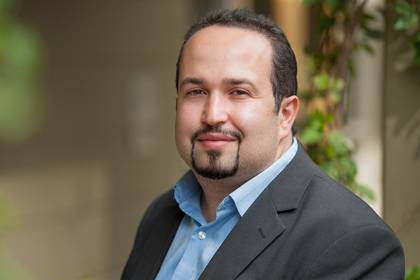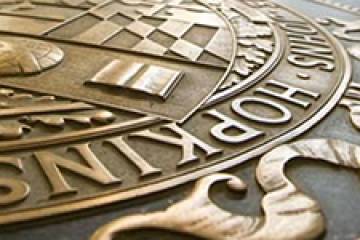The education that graduate students and postdoctoral fellows receive at Johns Hopkins is among the best in the world, but launching successful careers requires far more than training.
Today, Johns Hopkins University graduate students and postdoctoral fellows will gather on the East Baltimore campus for Professional Development Day, a full-day event dedicated to teaching the interpersonal and leadership skills that will help Hopkins students throughout their careers.
"What other people call soft skills I prefer to call success skills," says Farouk Dey, vice provost for integrative learning and life design.
An expert in the field of career and experiential learning, Dey joined Johns Hopkins this summer to bridge students' academic and career goals.

Image caption: Farouk Dey
"I want students to think of their entire college journey as an opportunity to propel them towards their future," he says. "It's not necessarily only about creating a career but about connecting their experiences and learning with their life aspirations."
Professional Development Day will feature 10 one-hour breakout sessions covering a range of career competencies such as communication strategies, building and maintaining a professional online presence, time management, and mentoring. The day's events will conclude with a Happy Hour Fair for participants to network, receive resume feedback, and enjoy refreshments from local ice cream and beer vendors.
In advance of Professional Development Day, the Hub caught up with Dey, who will provide the keynote address, to discuss his vision of integrating education with professional development at Johns Hopkins.
What are some of the specific skills that students should learn before joining the workforce?
Because of the advancements in artificial intelligence and automation, students should learn communication abilities—both speaking and writing—as well as problem-solving skills and critical thinking. They need to learn to work with others across cultural barriers to achieve their goals.
These are the most critical skills, especially as some fields become increasingly automated. Employers are looking for graduates with cognitive abilities and personal dimensions—qualities that can't be automated in the future.
What do you plan to discuss during your keynote address?
I plan to discuss the different ways of thinking that have been used in older career development models and offer a different approach that focuses on design thinking instead.
Life design favors experience over predicting what students will be doing in their careers. Life design favors engaging and experiencing the avenues of prototyping and testing your ideas that may have emerged from moments of inspiration. It's about ultimately constructing a passion and life's purpose. Life design is a much more proactive approach.
I intend to speak about the importance of creating personal purpose and allowing that to drive one's career strategy and decisions. I will also speak about the importance of taking risks, of persistence, of pursuing curiosity, and of being prepared for chance events that might bring opportunities to us.
The Happy Hour Fair is a significant part of Professional Development Day. Why is it important to include opportunities for socializing during professional development?
Being engaged in a community that supports one's interest in a particular area is very important because it actually increases the likelihood for luck to happen. We often hear people say that the reason they landed a role or opportunity was out of luck, or by accident. But in fact luck may have had very little to do with it—they made choices to position themselves among networks or join communities, which helped them establish their presence and create meaningful connections that eventually exposed them to opportunities. Getting involved in networks is crucial to luring luck out of hiding.
You recently joined the university as the vice provost for integrative learning and life design. What have you discovered in your role so far?
This is a really key moment for our institution; we're reconsidering how students develop and reach their life and career goals. We're working on developing a strategy to help students establish their life vision and achieve their dreams; we're excited to help shape our students' futures, and also help our institution grow and inspire others to do the same.
Farouk Dey is conducting a listening tour to learn the needs of Johns Hopkins students as they plan their careers. Follow his progress on Twitter.









